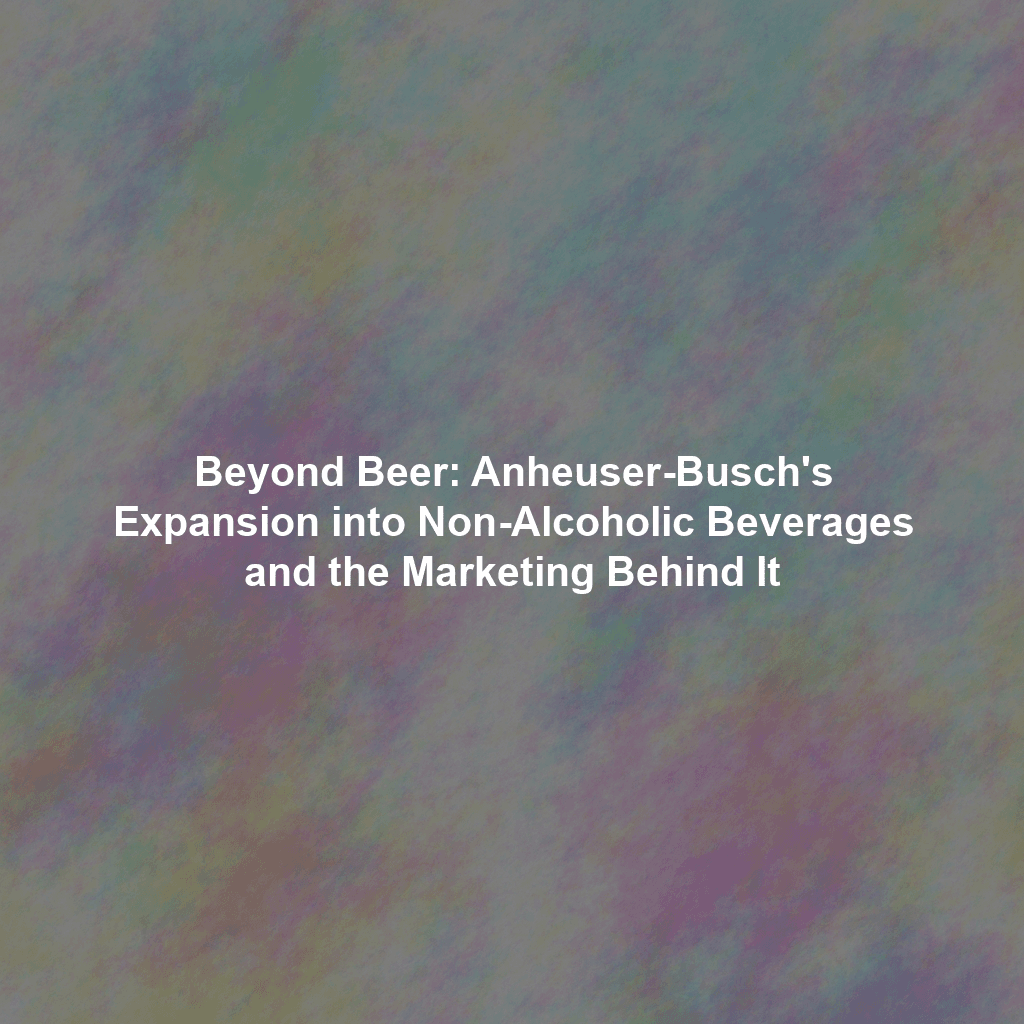Anheuser-Busch, a name synonymous with iconic beer brands like Budweiser and Bud Light, is no longer solely defined by its brewing prowess. The beverage giant is strategically diversifying its portfolio, venturing boldly into the burgeoning non-alcoholic beverage market. This move reflects a keen awareness of evolving consumer preferences, a commitment to innovation, and a sophisticated understanding of modern marketing. This article delves into Anheuser-Busch’s non-alcoholic ambitions, examining the specific products, targeted marketing campaigns, and the broader strategic implications of this diversification.
Why Venture Beyond Beer? Shifting Consumer Tastes and Market Dynamics
The decision to expand beyond beer isn’t arbitrary; it’s a calculated response to several converging factors:
- Changing Consumer Preferences: Health and wellness trends are driving demand for lower-calorie, low-sugar, and non-alcoholic alternatives. Consumers, especially younger generations, are increasingly mindful of their alcohol consumption.
- Market Growth in Non-Alcoholic Beverages: The non-alcoholic beverage sector is experiencing significant growth, presenting a lucrative opportunity for established players to capture market share.
- Diversification as Risk Mitigation: Relying solely on beer sales exposes Anheuser-Busch to market fluctuations and evolving regulations. Diversification provides a buffer against these potential risks.
- Innovation and Brand Extension: Expanding into new categories allows Anheuser-Busch to leverage its brand equity and expertise to develop innovative products that resonate with new audiences.
Anheuser-Busch’s Non-Alcoholic Arsenal: A Diverse Portfolio
Anheuser-Busch’s non-alcoholic portfolio is becoming increasingly diverse, reflecting its commitment to meeting a wide range of consumer needs. Key product categories include:
- Energy Drinks: Anheuser-Busch has strategically invested in and partnered with energy drink brands, recognizing the category’s appeal to younger consumers and those seeking a boost of energy.
- Flavored Malt Beverages (FMBs) without Alcohol: While technically still brewed, these offer familiar flavor profiles without the alcohol content, appealing to social drinkers looking for a lighter option. Examples include non-alcoholic versions of popular FMB brands.
- Sparkling Water and Enhanced Water: With the growing popularity of flavored sparkling water, Anheuser-Busch is likely to explore opportunities in this category to cater to health-conscious consumers.
- Other Non-Alcoholic Alternatives: The company is actively exploring other categories, including non-alcoholic cocktails and beverages targeting specific demographics.
Marketing Strategies: Targeting New Audiences and Shaping Perceptions
Anheuser-Busch’s marketing strategies for its non-alcoholic beverages differ significantly from its beer campaigns. The focus shifts to:
- Targeting Health-Conscious Consumers: Emphasizing the low-calorie, low-sugar, and natural ingredients in its non-alcoholic offerings.
- Appealing to Younger Generations: Utilizing social media and influencer marketing to reach Gen Z and Millennials, who are more likely to embrace non-alcoholic options.
- Promoting Responsible Consumption: Highlighting the benefits of moderation and providing alternatives for social occasions where alcohol isn’t desired or appropriate.
- Building Brand Awareness: Creating distinct brand identities for its non-alcoholic products, separate from the beer brands, to avoid brand dilution.
- Experiential Marketing: Sponsoring events and creating activations that showcase the non-alcoholic beverages and their versatility.
Messaging and Branding: A Delicate Balance
The messaging around Anheuser-Busch’s non-alcoholic beverages is carefully crafted to appeal to specific target audiences while maintaining the brand’s overall image. The key is to avoid directly competing with its beer brands and to position the non-alcoholic options as complementary choices for different occasions and lifestyles.
Promotional Campaigns: Leveraging Digital Channels
Anheuser-Busch utilizes a multi-channel marketing approach, with a strong emphasis on digital channels. This includes:
- Social Media Marketing: Engaging content, influencer collaborations, and targeted advertising on platforms like Instagram, TikTok, and Facebook.
- Content Marketing: Creating blog posts, articles, and videos that highlight the benefits of non-alcoholic beverages and showcase the company’s commitment to innovation.
- Search Engine Optimization (SEO): Optimizing website content and online presence to rank higher in search results for relevant keywords.
- Paid Advertising: Utilizing online advertising platforms to reach specific demographics and interests.
Challenges and Opportunities: Navigating the Non-Alcoholic Landscape
Entering the non-alcoholic market presents both challenges and opportunities for Anheuser-Busch:
Challenges:
- Competition: The non-alcoholic beverage market is already crowded with established players and emerging brands.
- Consumer Perception: Overcoming the perception that Anheuser-Busch is primarily a beer company and convincing consumers to embrace its non-alcoholic offerings.
- Distribution: Establishing effective distribution channels to reach target consumers, particularly in locations where beer sales are restricted or less prevalent.
- Maintaining Brand Integrity: Ensuring that the non-alcoholic brands align with the overall Anheuser-Busch brand values and image.
Opportunities:
- Growth Potential: The non-alcoholic beverage market is expected to continue growing rapidly, offering significant potential for revenue growth.
- New Customer Acquisition: Reaching new demographics and attracting consumers who may not typically purchase alcoholic beverages.
- Brand Building: Strengthening the Anheuser-Busch brand by demonstrating innovation, adaptability, and a commitment to meeting evolving consumer needs.
- Corporate Social Responsibility: Promoting responsible consumption and offering healthier beverage options.
Conclusion: A Strategic Pivot for Long-Term Success
Anheuser-Busch’s foray into non-alcoholic beverages is more than just a fleeting trend; it’s a strategic pivot designed to ensure long-term success in a rapidly changing market. By understanding evolving consumer preferences, embracing innovation, and implementing targeted marketing campaigns, Anheuser-Busch is positioning itself to become a major player in the non-alcoholic beverage space. While challenges remain, the opportunities for growth and brand building are significant. The future of Anheuser-Busch may very well be defined not just by its iconic beers, but also by its ability to successfully diversify its portfolio and cater to the diverse needs of modern consumers.
 Skip to content
Skip to content

